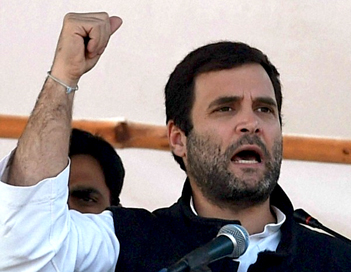New Delhi, Sep 20: Charging that Prime Minister Narendra Modi has "no time" to meet farmers and hear their woes, Congress today said it would take the fight on the "anti-farmer" land bill to the states.

Accusing the Prime Minister of going back on his promises made during Lok Sabha polls and "talking hollow" after coming to power, she charged the Prime Minister has "no time" to meet farmers and address their woes as he has time and interest only for his "few industrialist friends".
"Yes, he has also the interest, time and money for foreign trips," the Congress President said taking a jibe at Modi's foreign visits.
Holding that a party, which fought to get India freedom from the Britishers and participated in the growth story of the nation for 60 years cannot be anti-development, Sonia said that whenever the government does not listen to the problems of the farmers and the poor, Congress will stand in its way.
"The Congress will act as an obstacle in their way whenever they stop giving an ear to peoples' problems, whenever farmers are not given Minimum Support Price, whenever drought and flood affected farmers are left at the mercy of God and the price of edible items is not brought down.
"If development means benefiting few persons, we will definitely act as a roadblock in such development," she said alleging Modi is trying to paint Congress as anti-development in order to "hide failures" of NDA government.
Hailing the farmers as "not only Annadaata but also Bhagyavidhata" (not only food giver but destiny makers" of the country, she said the farmers are undergoing one after another crisis ever since Modi government came to power.
On the land bill she told the farmers, "The fight is yet not finished. The battlefield has now only shifted from Delhi to states as the Prime Minister, after having failed to do it at Centre, is trying to get it done in states. We need to be all the more careful now, otherwise your struggle will go in vain and you will driven away from your land."
Terming the fight on the land issue, a fight for "not only land but honour of farmers, who treat land as mother," Rahul asked them not to trust the promise made by Modi few days back not to bring changes in UPA land law, which came after Modi government promulgated the ordinance three times to press them.
"We know what Modi ji is. He does not say what he thinks. That is why on one hand, he said that he will change the Congress law and on the other hand asked his Chief Ministers to bring them (the changes)."
Telling farmers that the fight is not over in Parliament, he said,"I want to tell the leaders of Congress in states. This is not only a fight of Parliament. This has also to be fought in Assemblies."





Comments
Add new comment